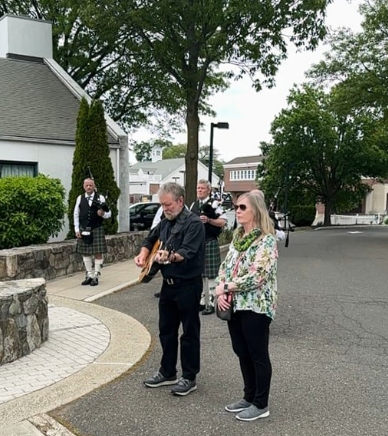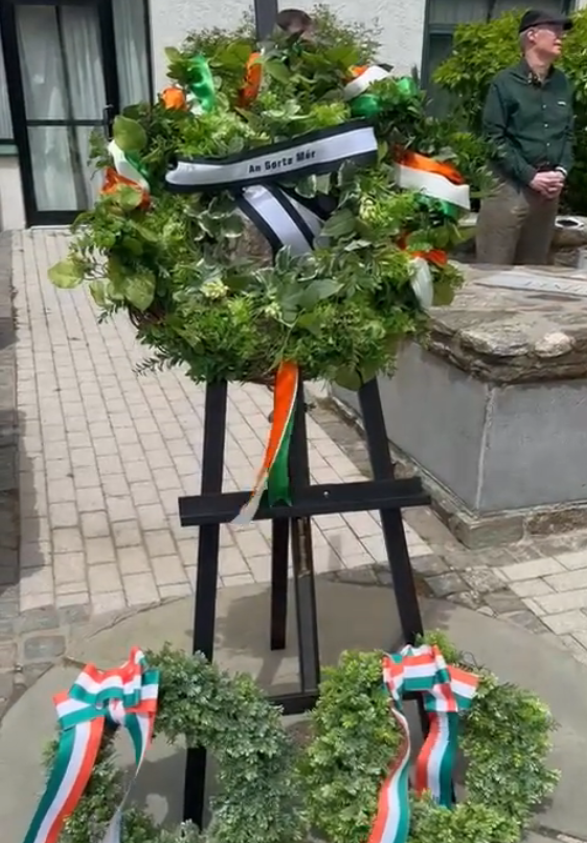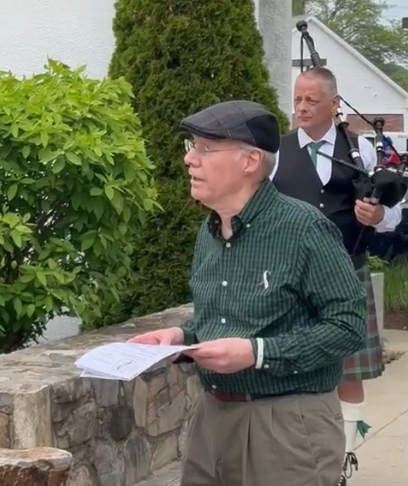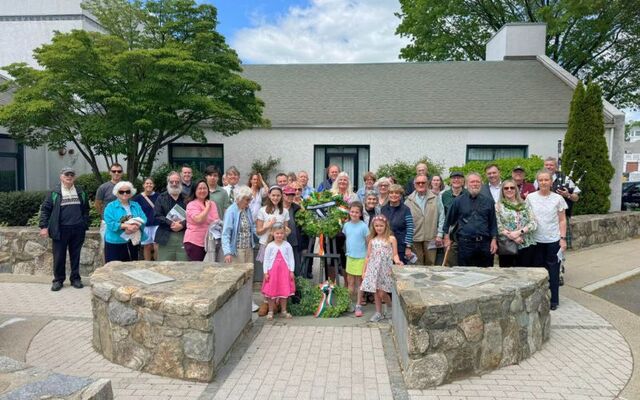On Sunday, May 18, the Gaelic American Club in Fairfield, Connecticut, hosted the 2nd Annual Irish Famine Commemoration Day Ceremony, an event held in conjunction with Ireland's Great Hunger Museum of Fairfield.
This solemn and poignant gathering paid tribute to the millions affected by one of the darkest periods in Irish history - the Great Hunger of 1845 to 1852.
The ceremony commenced with the stirring performances of the Irish and American National Anthems, sung by Judy O’Halloran Sullivan and Con O’Halloran, setting a reverent tone for the occasion.

Singing the National Anthems of Ireland and America, Judy O’Halloran Sullivan and Con O’Halloran.
The laying of the Famine Commemoration wreaths by Cara and Wren Griffin and Jessica and Anna Sweeney was followed by a minute of silence, a symbolic gesture honoring those who perished and those forced to flee their homeland during Ireland's darkest period, the Irish Famine.

John Foley, President of Ireland's Great Hunger Museum of Fairfield, delivered heartfelt remarks, emphasizing the significance of the commemoration. "For the millions who were cast to the open seas without care, and for the hundreds of thousands who died and are now buried in mass graves,” Foley said, “we stand here today, this one special day dedicated to their memories."
Bill Lenahan, on behalf of the Gaelic American Club, echoed the sentiment: “Today we commemorate the Irish Famine Victims, the nameless innocents who perished from hunger due to a man-made famine.”
Lenahan added: “By commemorating the famine, the Gaelic American Club strengthens the bonds of the Irish community. Along with Ireland's Great Hunger Museum of Fairfield, we hope to ensure that history is never forgotten. We must always remember."

Bill Lenahan of the Gaelic American Club in Fairfield, CT.
A highlight of the ceremony was the recitation of "Na Fataí Bána" ("The White Potatoes"), a poem by Athenry farmer Peatsaí Ó Callanáin, performed in both Irish and English by members of The Irish Language Club: Maura Kallaway, Robin Griskus, Des Nolan, and Kathleen Donnelly. Their eloquent delivery bridged history and language, keeping the spirit of Ireland’s heritage alive.
The poem is a haunting lament written during the Great Famine of Ireland in 1846. It mourns not only the loss of life but also the devastation of the potato crop and the sorrow of watching neighbors perish while the staple food rotted away without frost or cold. Ó Callanáin’s words express grief for both the dead and the dying land.
Na Fataí Bána / The White Potatoes by Peatsaí Ó Callanáin in 1846
A thousand farewells to the white potatoes
For as long as we had them, a pleasant hoard
Affable innocent, coming into our company
As they laughed us at the head of thе board
They were hеlp to the nurse, to the man and the child
To the weak and the strong, to the young and the old
But the cause of my sorrow, my grief, my affliction
Them rotting away, without frost, without cold
What will buy a shroud for those to be buried?
Tobacco, pipes or a coffin of wood?
If we are to die now may the High King protect us
And, of course, it would be a release if we could.
As the event drew to a close, the Fairfield Pipe band—comprising Angus Maciver, Sean Kelly, Jeremiah McCarthy, and Zoltan Makroczi—brought the ceremony to a solemn conclusion with their moving rendition of "Amazing Grace." The music echoed through the crowd, a final tribute to those lost to the Great Hunger and a reminder of the resilience and strength at the heart of the Irish diaspora.
Irish Famine Commemoration Day is held on the third Sunday of May. In 2026, we will commemorate the Irish Famine in Connecticut on Sunday, May 17.
This article was submitted to the IrishCentral contributors network by a member of the global Irish community. To become an IrishCentral contributor click here.




Comments